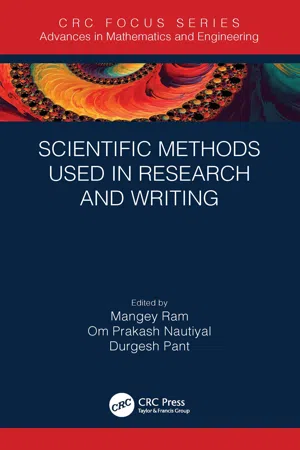1.1Introduction
“What is research?” is a question that every scientist/academician/researcher asks at some point in his career, but it is one that is very difficult to answer. With experience, however, each arrives at their own answer. The word “research” derived from an old French word, “recerchier,” which means “to look for/to search for/search to search.” Research may simply be defined as a “search over search.” It is a search for the “What, Why, Why not, How, In what ways?” of the phenomenon, ideas, and facts of varied fields of sciences. It is a method for exploring, investigating and collecting information targeted at the discovery of new and novel facts for interpreting existing information, to discover or revise facts, theories, and applications (Kasi, 2009). The joy of research must be found in doing because every other harvest is uncertain (Nuttall, 1935). The new, novel and unknown aspect of research adds joy to the research, but it is also what makes it so difficult. However, this difficulty and complexity bring with it the encouragement and motivation to research. Thus, it is important to enjoy the process of research and to see the entire process as a learning experience.
The aim of the present chapter is to provide a brief guide for Early Career Researcher (ECRs) about how to begin and move forward effectively in their research fields, and how to publish their research in renowned journals. We start by explaining the basic research process, the structure and organization of a research paper, and the article with views of reviewers about the essentials of a good research paper for publishing in top journals.
To start with, the research process could be either inductive or deductive. Inductive research is a “bottom-up” research process, which is primarily a data-driven-exploratory process and is regarded as qualitative research. It uses methods such as case studies, grounded theory, and ethnographic study, paving the way for new theoretical explanations, and the development of new hypotheses in a field. The deductive process is a “top-down” approach, which focuses on verifying an a priori hypothesis. It places itself on the logical premises of a theory, where is a theory and its proposed hypothesis are correct then the results upon empirical or analytical testing must come as expected (Woo et al., 2017). In a nutshell, inductive research aims to analyze an observed phenomenon, whereas deductive research aims to verify the observed phenomenon. It is to be recognized that a balanced mix of deductive and inductive research is essential for the advancement of a field. While inductive qualitative research could be complex and laborious, especially for ECRs. But it is essential for new theoretical explanations in a field. A particular field can only achieve slight advances without the adoption of such an approach. Similarly, deductive research is essential to validate theories and verify principles across the field. Multiple factors play a crucial role in publishing both types of research.
An ECR should ideally decide his methodological approach based upon the theoretical positioning of his research. While a decision over the adoption of a particular research methodology is important, publishing the research in top-tier journals is still a different ball game. It is critical in terms of advancing an ECR’s career as well as for promoting their field of research. It is often observed that a handful of researchers publish many papers in top-tier journals, whereas many researchers publish just a few papers over a long period. Straub (2009) proposes that one explanation for such a distribution of publications is that, for the majority of the time, people do not have a full understanding of why top journals accept a particular paper. Stout et al. (2006) identify poor motivation, poor design, and little original contribution to the field as the three most significant reasons for the rejection of an article. Thus, it can be said that “publishing is an art and a journey.” A researcher needs to enjoy this journey and learn through this journey about how to publish his research in good journals.
